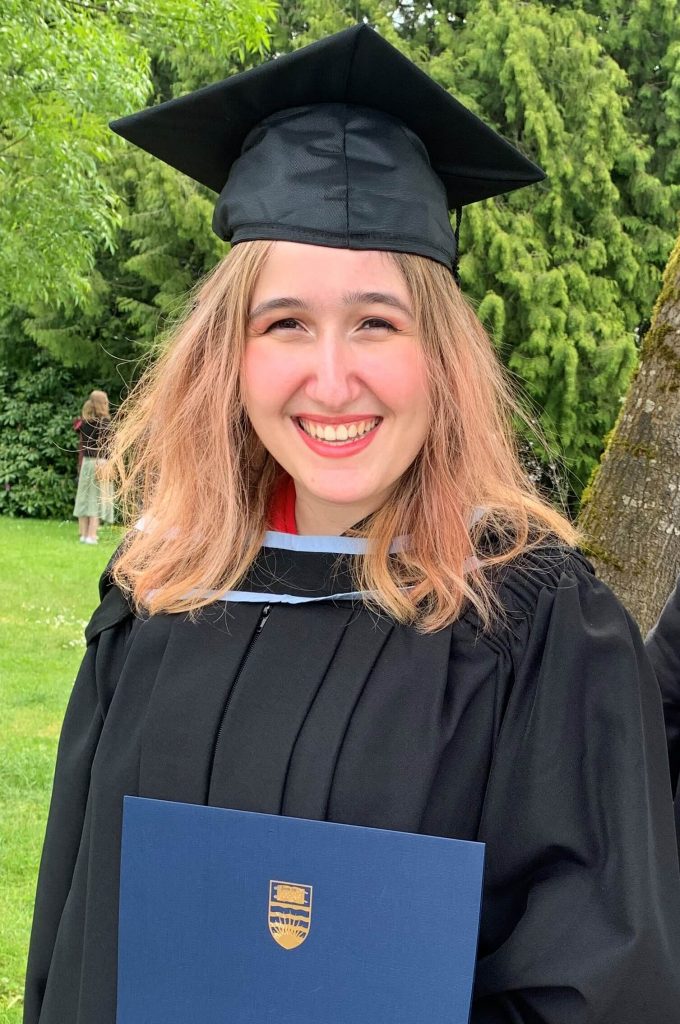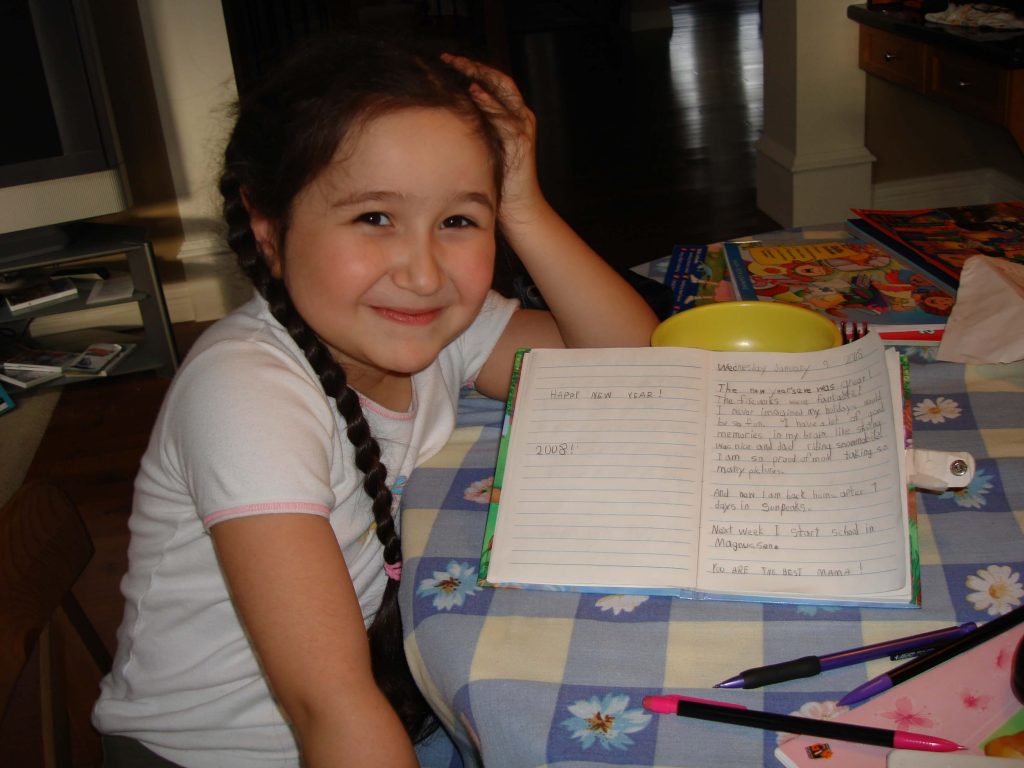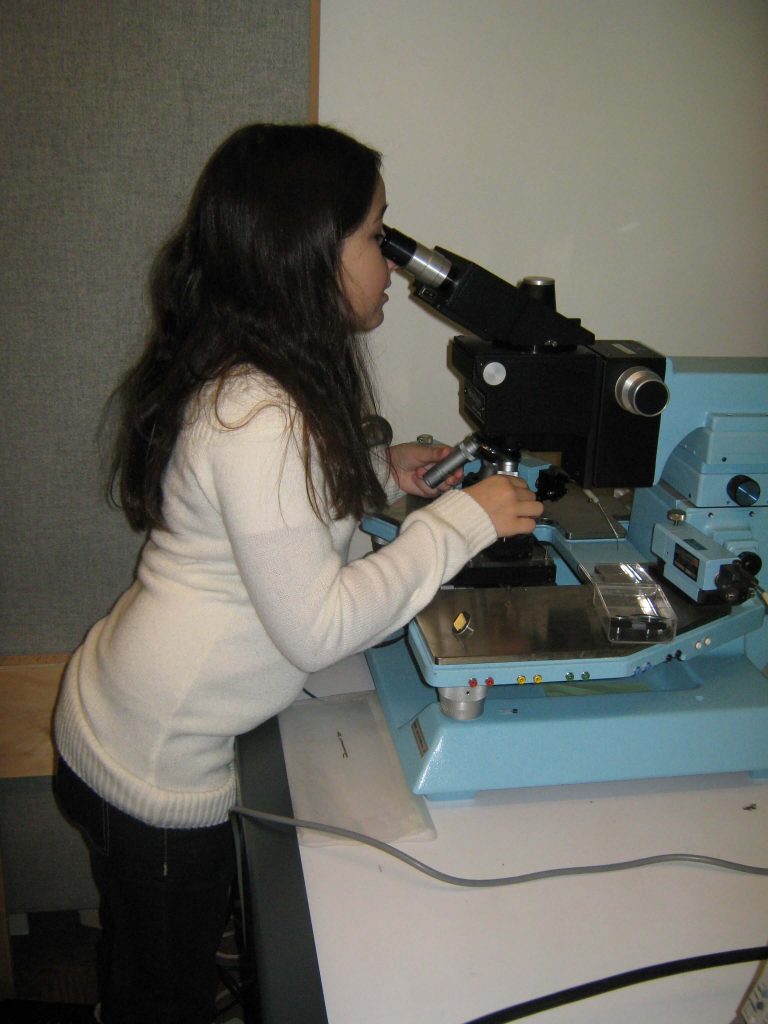
Maya Tselios recently graduated with a BSc in Biology and may be the youngest person ever to have graduated from this program, having been accepted to UBC when she was only 13 years old!
Some words that describe Maya are: smart, fun, energetic, and persistent. She has diverse interests and has already accomplished many things in her life, such as publishing a patent at age eight (which was cited by Xerox!), publishing a research article, and working in a university laboratory. She also has many different hobbies that she pursues in her spare time.
Maya is part of a very social and supportive Greek family, and she loves living in the Lower Mainland. Born in Burnaby, Maya has also lived in Surrey and now resides in Langley. When it came time to go to university, Maya knew that she wanted to attend UBC so that she could stay close to her family and where she grew up.
You were accepted to UBC at the age of 13, how did that happen?
My childhood was pretty unusual. I said my first words when I was 42 days old, and at seven months I started reading. My mom was amazed because she’d walk me in the stroller and I would be reading the signs around us as we passed them. I probably gained this ability because when my mom would watch movies or TV shows, she’d have the subtitles on so that she could follow along. I was able to count from 0 to 100 (and backwards) by age one, and by age one and a half, I was reading books and would read my own bedtime stories to my mom instead of the other way around!

All of this prompted a psychoeducational analysis, which concluded that I’d be ready for grade four when I was four years old. Then came the challenge of getting into a school that would let a four-year-old be in grade four. I went to various public and private schools, but they either didn’t have the resources to help me move forward or the students would be uncomfortable with my presence. It was difficult because not only was I much younger than the other students, but I’d also move through the grades really quickly. I ended up going to an online school where all the learning materials were on a platform similar to Canvas and I could email the teachers whenever I needed help. I was able to move through modules at my own pace and I finished them quickly, so that at age eight I took my first provincial exam in person, Foundations of Math 10.

I was supposed to graduate high school when I was 11 years old, but I was discouraged to apply for UBC at that time by my gifted coordinator because she thought that I was too young to go to university. So I continued doing electives and also did concurrent studies at SFU so that I’d have English courses to transfer over to UBC. I then applied to UBC when I was 13 and was accepted into the Science One program.
How was your experience entering into the university environment?
No one really prepared me for university and I struggled a lot during my first year. I had previously raced through online school at my own pace, and I only knew school as reading through modules and taking exams in a testing centre in person. I didn’t know how to sit in a classroom, look at slides, and take notes by hand, so going to class was a new and challenging experience for me. Additionally, although I didn’t know it at the time, I had Strabismus, which caused one of my eyes to drift outward and made it hard for me to read and study for sustained periods of time. I had to put extra effort into turning my eye inward, which made me skip past lines when reading and gave me fatigue and made it difficult for me to retain information, causing me to stay up late each night studying and leading to extreme sleep deprivation.
I also had trouble interacting with my classmates. I wanted to hide the fact that I was younger than everyone else because I just wanted to fit in and I didn’t want people to judge me based on my age. But the other students found out my age from how childish and naive I was, and I was bullied by classmates who didn’t want to talk to me or work with me in group projects. Between the disorientation with learning in a classroom setting, sleep deprivation, and bullying, I didn’t do well during the first year and I failed most of my exams.
I was afraid to go to the professors for help because I thought that I would come off as asking for special attention. I was in this unique position where I was a kid showing up at a university and then suddenly having so many problems; I was afraid that they’d think that I just wanted attention or special treatment. I wanted to feel like an adult and project myself like I was independent and could do this on my own without needing someone to hold my hand, but it turned out that, no, I could not. I failed my courses that first year, so I had to drop out. However, I was able to publish a paper in the Canadian Journal of Undergraduate Research based on a research study I did in Science One shortly after I left, which I am incredibly proud of.
After achieving so much academic success in high school, what was it like to go to university and experience failure?
I didn’t expect it, and it was like a slap in the face. I went into university expecting to do well because I learn things really quickly, I have a good memory, and I did well in my previous coursework. But this was a totally different learning experience than I’d had before, and the workload and sleep deprivation hit me like a truck. I didn’t know what to do or how to get the support I needed.
With that failure came impostor syndrome because I didn’t feel like the person that I thought I was. I’d done so much up through high school and then things suddenly changed, and it was like, am I really this person? I felt like I let down everyone who expected something of me.
But even though all these things happened to me in my first year, I still managed to bounce back. I went to Langara College and I took all of the first-year courses again and some of their second year courses. Then I went to Thompson River’s online division and took two more second year courses, so that by the time I came back to UBC, I was already midway through second year biology. Then things started looking up.
My time at these institutions and in these smaller classes helped me to feel comfortable asking professors for assistance when I needed it, and by this time I had already gained the skill of understanding in-person lectures. So when I came back to UBC in second year, it was a much easier experience.
How did you get through this time of your life?
My mom was incredibly supportive and she was with me every step of the way. I fell into a deep depression during this time, and it was my mom who helped me to keep going. She’s the one who pushed me to publish the paper and she helped me to apply for other colleges and encouraged me to bounce back. She also drove me everywhere. She’d do the commute every day from Langley to Vancouver to get me to my classes, and then she’d sit with me late at night and help me memorize the material. It was a heartwarming experience and I was really happy to have my mom next to me during that time in my life. She’s probably the only reason why I managed to bounce back because at the time I didn’t feel like I was accomplishing anything.
In hindsight, five years after what happened, I’m very proud of how far I’ve come. Failure was an important experience for me, and it was bound to happen eventually. I’m glad it happened at that point in my life; it made me learn a lot about myself, made me understand the struggles my peers face, and among other lessons, I realize how lucky I am, at the very least, to study at a post-secondary institution. There is no chance I would be the person I am now if things went differently.
How was your experience coming back to UBC in second year?
At this point I wanted to be social and talk to people, so I put a lot of effort into hiding my age from others. I was worried that people would avoid me because of my age, because that’s what happened during the first year. I tried to project myself as being older than I actually was and this time around people didn’t treat me differently based on my age. The truth would have to come out eventually, me being picked up by my mom after every class and not wanting to go out as a group with my adult friends for drinks kind of gave it away, but by then they would already have gotten to know me. It was like a breath of fresh air to meet a bunch of mature peers and talk with them and make important connections with them. I got to see what it was like when people didn’t have predispositions about what kind of person I am based on my age.
I also found a community of people who I could talk to and who could help me. I made friendships with people in my classes and through extracurriculars, and I even helped to start a club at UBC to support first-year students, repurposed into a on-hiatus podcast after all of the executives of the club graduated and COVID came around. Now that I had an actual support group and people who supported me, it was incredible. I felt like an adult and I felt independent, like I could handle myself in terms of my courses.
I also got to do lab courses, which was my favourite part of university. I really love the hands-on aspect of labs and seeing things happen rather than just reading about them. I just graduated and I miss lab courses already!
How are you planning to celebrate your graduation from university?
I might go to Greece. I haven’t visited my Grandma in a while and Greece is incredibly beautiful. I’d like to go back and spend some time at the beach and get some sun, especially because we don’t get a lot of sun here in the Lower Mainland. Personally, any weather above 18 degrees is too much for me to handle, but maybe wearing a big sun hat and having family around will mitigate that problem. The first time I went to Greece I visited all of the historical and archaeological stuff. I had a great time and learned a lot, but this time I think I’d like to relax and enjoy time with my family.
What do you like to do in your spare time?
I love playing video games and I have many friend groups that I game with online. I enjoy playing Guild Wars 2 and I recently started getting into League of Legends, but I also like playing Smash Bros, Mario Kart, Mortal Kombat, Final Fantasy… anything really. Several years ago I was able to combine my love of science and video games through an online game called Foldit where you could fold proteins using an algorithm. The game was created as part of a huge research project, and while I was playing with it for fun I ended up placing first in the world for one of the proteins. Because of that, I’m credited as one of the player authors in the Foldit research paper!
I also play a lot of sports. I used to be a competitive figure skater and I competed in a synchronized figure skating team across B.C. when I was 11. I played hockey for a short period of time, and I currently ski, snowboard, and play badminton and tennis, in addition to doing taekwondo as my primary sport.
Additionally, I have an artistic side. I enjoy playing the piano and I participate in recitals twice a year. I was classically trained when I was younger, but I just learn whatever I think sounds fun… which happens to be a lot of boss battle music. I do digital art too, and I think I’m pretty good at it, but I do need more practice! I also like being the entertaining friend in a group and making people laugh. I took a comedy class at UBC and got to write my own jokes and stand-up and really enjoyed it!
Pretty much I learn skills really quickly, so when I’m not doing anything, you’ll find me shifting from interest to interest and picking up something new just for the heck of it!
What are your plans for the future?
I want to go to medical school because I want to do something that will save lives. If I could save at least one life, I will be happy, and if I can save more than that, then I will be even happier. I’ve taken the MCAT twice already, and I’m planning to take it again sometime soon now that I don’t have school anymore and I’m no longer sleep deprived.
I really want to pursue something brain-related, such as neurology. I love the brain so much; it is my favorite part of the human body and I want to know more about it. There are so many diseases that come from the brain and not enough research in terms of human patients. It would be incredibly helpful for a lot of people if we knew more and could start formulating new treatments that are both easy and accessible. If I can be a part of that, it will be very fulfilling.
That’s the academic plan, and in terms of life plans, I am just feeling like going wherever life takes me. I really like learning new skills and trying out new things, and I think that I’d like to get more in touch with my artistic side. For example, I’ve been writing, designing, and coding a video game on my own as a passion project and that’s been really fun. Mostly, I’m just trying to live my life to the fullest.